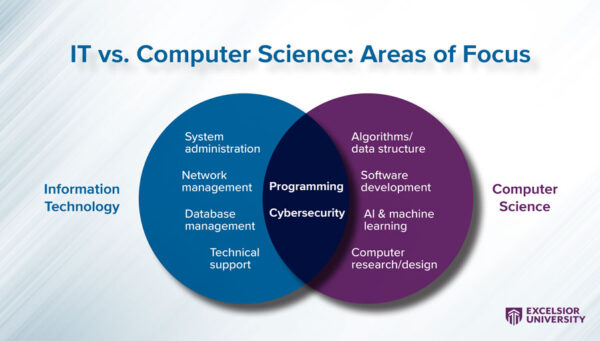What’s the Difference Between Computer Science and Information Technology?

In today’s digital age, information technology (IT) and computer science (CS) have become everyday staples to the advances of modern society. Although often used interchangeably, these disciplines are distinct in their focus and applications. Understanding the differences between IT and CS is crucial for aspiring professionals and businesses because each field requires specialized skill sets to drive technological progress. Let’s explore each field so you can better choose the right educational and career trajectory for you.
What Is Information Technology?
Information technology involves using technology to solve business and organizational problems. Professionals in this field manage and use computer systems and networks to store, retrieve, transmit, and protect information.
IT professionals work in various areas, including:
- Cybersecurity: In this area, experts protect systems, networks, and data from cyberthreats.
- System administration: Professionals oversee installation, support, and maintenance of servers and other computer systems.
- Network management: Here, IT professionals ensure that communication within and between organizations is reliable and secure.
- Database administration: In this area, professionals focus on data organization and database management to ensure accessibility and security.
- Technical support: Experts assist end users experiencing technical issues with hardware or software.
Be at the forefront of technology with a degree from Excelsior University.
How Is Computer Science Different Than IT?

After reading about IT, you might wonder how computer science can be different. Whereas information technology focuses on the effective operation and maintenance of computers, software, databases, networks, and systems, computer science is concerned with designing and building computer hardware and software. Indeed, computer science focuses on the more theoretical and mathematical side of computer and network systems. It includes a range of topics, including algorithms, programming languages, software development, computer architecture, artificial intelligence, cybersecurity, and more. As with cybersecurity, programming—though the level and context of its application may differ—is an area of overlap between CS and IT.
Some of the key focus areas of computer science include:
- Algorithms and data structure — designing efficient ways to store, organize, and process data
- Programming — writing code to create software applications like operating systems and mobile phone apps
- Software development — building and maintaining software systems
- Artificial intelligence and machine learning — developing systems that can learn and make decisions
- Theoretical computer science — using mathematical concepts to explore areas of computing, including computational theory and cryptography
- Human-computer interaction — improving how users interact with technology
IT vs. Computer Science: Which Degree Is Right for You?
Now that you know the difference between IT and computer science, what career field should you go into? What degree should you consider earning?
IT degrees usually focus on topics in project management, operation and maintenance of information systems, and customer service, whereas computer science degrees focus on designing and building computers and computer systems, software development, and programming languages. IT degrees focus on applying technology to solve real-world problems, and computer science degrees focus on understanding and developing new technologies.
Choosing an IT or computer science degree depends on your interests, career goals, and the type of work you enjoy. If you want to become a network administrator, cybersecurity analyst, or technical support specialist, an IT degree is the better choice. On the other hand, if you want to be a software developer, data scientist, or AI researcher, you’re better off pursuing a computer science degree.
Both information technology and computer science are important to the tech industry, offering diverse opportunities and rewarding careers. Whether you’re drawn to the practical, problem-solving nature of IT or the innovative, development-focused realm of computer science, both paths offer the chance to make significant contributions to the digital world.




